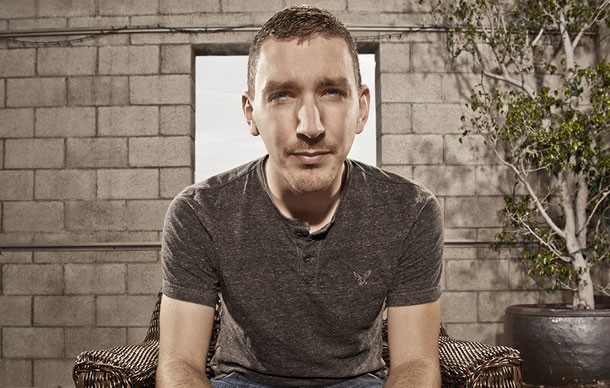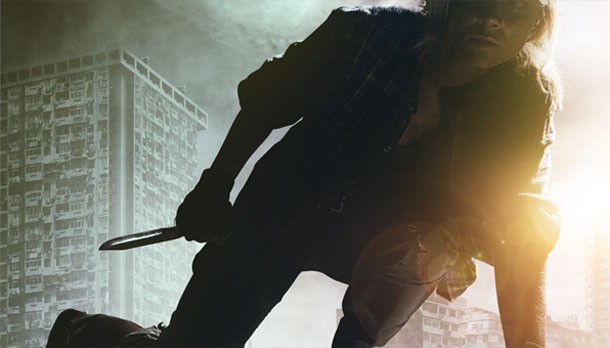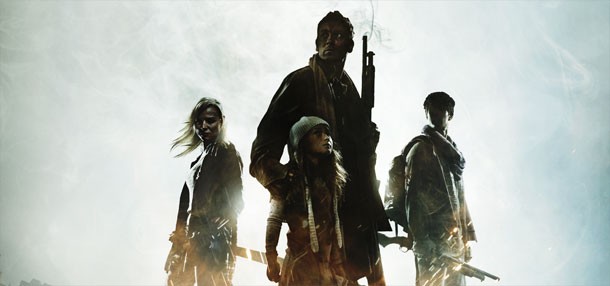Please support Game Informer. Print magazine subscriptions are less than $2 per issue
Taking On The Human Element

[Note: This article originally ran in issue 231 of Game Informer]
After spending six years working on the Call of Duty: Modern Warfare franchise at Infinity Ward, former creative strategist Robert Bowling decided to quit and form a new independent game company called Robotoki. His team’s first project, Human Element, aims to explore the greatest threat in a zombie apocalypse.
We spoke to Bowling about his decision to leave Activision, details on Human Element, and where he hopes to take Robotoki in the future.
--------------------------------------------
What’s the story behind your departure from Activision? It seemed pretty abrupt. How long have you been thinking about the decision?
Well there’s no preplanning about it. It’s something that just happened naturally and organically. Most importantly, it’s something you can’t let any other decision or deciding factor make that decision for you. It can’t be about how much money you’re being paid. If you come to that point creatively, you just have to make the decision based on the merit for that alone. That’s literally what happened to me.
Over the course of working on one property for six years, regardless of how much you love what you’re doing on that property, you have two lists. You have a list of experiences, characters, moments, or gameplay mechanics that you love and think will be great but maybe just don’t fit that universe. They don’t fit with the story you’re trying to tell. And over the course of seven years that list gets longer and longer, and the list of things you’re passionate about within that universe gets smaller and smaller because you’re checking them off.
At a certain point when the list of experiences you want to deliver is larger than the things you’re passionate about within that universe, you have to make a decision creatively. That’s what I decided to do. I didn’t necessarily know the specifics about what I wanted to do, but allowing yourself to step back and dive in lets you figure that out. When I made the decision to leave, I knew one thing for sure. I knew what I didn’t want to do. I knew how I didn’t want to do it. And that led to clarity of how I did want to do it.
There was a lot of speculation when Respawn Entertainment formed that you’d leave Activision to join that studio. Was that ever something you considered doing or did you always want to do a new studio?
I was very clear with Vince and Jason from the beginning when they left and started Respawn that I would never apply there. And it’s not because I don’t love them. I honestly think they’re some of the best game creators in the industry. What I wanted to do was very different in philosophy and direction. There were things I wanted to achieve that were drastically different than what was done in the past. And not knowing what they were planning to work on, it felt like it would be better to step back and put yourself in the unknown, which allows you an unbiased, outside perspective on where you want to move in the future without being influenced by existing conditions.

Your job title went from community manager to creative strategist in 2008. Did that transition give you confidence you could start your own game studio? What did you learn from that experience that you’re now applying to Robotoki?
My role at Infinity Ward as creative strategist was a unique position that allowed me to be involved and work with every department and every discipline of the creative. I was one of the only business-facing roles. I worked in that buffer between dealing with the corporate and business side of the aspect in addition to the creative, which allowed me a unique perspective to figure out how to do things right and wrong based on how the business decisions are impacting the creative talent and creative decisions.
I was able to see that friction and therefore adapt philosophies and strategies on how to minimize that friction. When you sit back and think about it from a business objective, it’s to make money and profit first. You can’t approach that from a creative standpoint. They have to work very differently from each other, but they need to be supportive of each other’s goals. My transition into that role allowed me to be exposed to that and have access in a way that you typically don’t get purely being on the creative side.
What’s it like going from a multi-million dollar product on a hard two-year development cycle that sells millions of copies to Robotoki? What emotions are you going through?
It’s an extreme sense of relief. You’re no longer confined by anything. It’s a literal clean slate and it allows you to now learn from what you’ve done in the past through experience and now execute on that in a completely different way. It allows you to approach your design philosophy and process differently. That’s what was most important when setting up Robotoki: sitting back and determining that. That’s why it was so important to me to not rely on millions and millions of dollars of someone else’s money to fund that. I wanted to self-fund and get ourselves up and running with my own money so we could do it on our own terms. Once I created that foundation, which is what we have done now on our own terms, then it allowed us to approach things how we felt they needed to be approached and work with partners who felt the same way and could build upon that foundation with us with that in mind.
What’s the story behind the name Robotoki?
I don’t know if I’ll ever go into what the literal meaning of what Robotoki is, but the general philosophy is we wanted to create a name that was unique and didn’t have a real-world meaning. That allows our universes, properties, and unique studio culture to define that personality and to give that work meaning through our actions and the way we approach game development. It was important that we came out with something that did not exist. What I love about the name is it can be pronounced and perceived in so many different ways.
How big is Robotoki right now and what are your expectations for growing in the future?
Right now we’re just getting our core team together. We’re nailing down that core team of five guys. I hope to expand that in the next four or five months to a solid team across the disciplines of 16 [people]. Our plan now is over the course of the next year to be at 80 people.
Eighty people is where I’d like to stay. I think that sweet spot between 80 and 100 is really where you stick to being focused and working well without that excess and the worry of stretching too thin.

Where did your studio philosophies and culture come from? Did you develop them through past experiences and talking with other developers in the industry?
It was through experience, but not only at our own studios. I first started out in entertainment in music and film, and seeing how drastically different creative talent is treated in different mediums. It seems like music gets it right the most and film does very well, too. I think we have a lot to learn on how to treat creative talent. In a creative field, they’re not just workers, they require a specific type of emotional and intellectual investment in the products that they’re making in order to make quality products. It’s not a mechanical process. What I learned from experience is you can’t have everything you want. It’s just not possible. But you can have that one thing that means the most to you. And if we can allow them to have that one thing, it gives you one thing you can be invested in and it’s okay to make sacrifices in other places because you believe in that one thing so strongly.
Explain your development philosophy of creating the universe first, experiences second, and gameplay last?
It’s about approaching development differently because we’re looking at creating universes that are platform and genre agnostic. You can go in and say, “Okay, we want to make a great shooter game.” But you’re now inherently limiting the mechanics of your game and the ability to connect with that universe down to that one mechanic. That mechanic might be great on consoles, but it won’t be great on tablets because that’s not what the strengths of that are. We’re focusing on creating the universe first. If you’re connecting on tablet, it’s a very different experience than what you’re getting on console, but they’re all feeding into the same common experience within this universe. It allows us to not be restrained on the experiences we’re delivering. The thing is you have to think about it in terms of priority of process not priority of quality. So just because you’re focusing on establishing the universe first doesn’t mean the game mechanics are less important or should suffer because of that process.
What’s your overall thought on the games industry right now?
I think we’re in a very unique position as an industry right now. I think the important thing for us to realize is, and what we’re doing with Robotoki, is that it’s not about one experience anymore. That’s why I think it’s important to approach the universe first. It gives you the flexibility to be nimble and look at how you can change your approach on how your players are engaging your universe, and more importantly not forcing your players to enjoy it how we traditionally think they should experience it.
I think that’s the key difference. We’re realizing as an industry that there are a wide variety of types of players who are looking for different things out of their games. I think we’ve moved past the era of telling players how to enjoy our games. It’s much more our job to create a platform to let them dictate the experience for themselves and we guide the overall experience but the specific game mechanics should be in their control. That’s what we’re focusing on with our first IP, Human Element.
What can you tell me about Human Element?
The whole universe first, experience second, gameplay mechanics last, that whole philosophy on how we plan to design games just sets up the back end of this universe that we’re currently creating.
That universe is set on this whole premise of, “What is the greatest threat in a zombie apocalypse?” If you’re conditioned with the entire zombie culture it’s the infection, it’s the zombies. But in reality, they’re the walking dead. They’re weak. They’re really not a physical threat to you in a lot of ways. Their greatest strength is the fear that they instill in us, the survivors. They lead us to do unreasonable things to survive. By that logic, the greatest strength in a zombie apocalypse is the human element. The other survivors who are smart enough to kill you and take what they want and to threaten you and to do things like that.
Think of this as a zombie game that isn’t about zombies. This is 35 years after the event has taken place. What the event was is fairly irrelevant, but we’re living in this world now and we need to deal with it and we need to survive. It’s much more about that human element than the reason how we got here.

What are some influences for this game and its universe?
The influences were looking at how this universe has been depicted in the past, this core zombie universe, and taking the zombie elements out of it. Being inspired by the scenarios they would put us in, but now looking at it in a more reality-based scenario. Take the sci-fi element of zombies in The Walking Dead out of the equation. While it’s still there it’s not the focus, and thinking about the moral, emotional, and intellectual level is what was really inspiring for us. That’s from a story/universe standpoint.
From a gameplay standpoint, what was inspiring was the rise of mobile and social gaming, and the rise in the different ways you can now play games and engage within the universe that will make the Human Element so unique. Because the key thing is, you’re sitting in front of your TV playing that first-person, immersive experience and playing how you want to. Then you get up and leave your house. You’re traveling with your iPad. If you load up the Human Element on your iPad, you should still be able to connect to that universe and contribute to it and continue with your character and engaging in that world, but playing off the strengths of that specific device.
What we do now is, we’re pulling in your GPS data and the Google Maps API and we’re overlaying all that into the world of Human Element. So now you’re literally out scavenging and seeing real world businesses and locations that you can now scavenge for supplies. And those supplies and benefits you’re getting from that are feeding back into the progression and character in the console, at-home experience. What’s great about that is they can stand independently of each other. If I’m a console gamer and want to sit at home and put hundreds of hours into that experience and just play it for the action. Say I get hurt; I need supplies and need certain things I don’t feel like doing, but you’re an intelligence class player but you don’t have time to play on console, so you’re playing on your tablet and that’s all you play on. I can create an alliance with you, so you’re doing the scavenging and feeding that back into your alliance. So I’m benefiting from your work and you’re benefiting from the buffs that I give you as a strength class.
Even though we’re not playing the same experience, we’re contributing to the overall goal of survival.
What platforms are you aiming for your new universe?
Next-gen consoles, PC, mobile, and tablets.
When are you expecting to ship the game?
Right now we’re aiming for Q3 2015.
--------------------------------------------------
Building Character
Bowling says Human Element contains three main attributes players will choose from when creating their character: class, identity, and persona.
Players can choose from class types including action, intelligence, and stealth, with each offering a number of different abilities. For example, action-based players focus on fighting and physical attacks, while intelligence players can do things like barter, build more complex fortifications, and create alliances. The stealth class provides new quest options and allows you to evade basic defenses.
When selecting your identity, you choose from a solo adult, partnered adult, or adult with child. This acts the same as selecting a difficulty at the start of the game. “We don’t want to scale AI intelligence or damage or health," Bowling says. "That’s not how we want to scale difficulty. We want your identity, your specific scenarios determine the difficulty you’re going to have surviving purely out of responsibilities.”
Lastly, Bowling says persona determines a player’s sex and race. “How you choose to start in the world will determine how you can engage and impact in the scenarios you will be presented with on a physical and moral level that you approach this world.”










